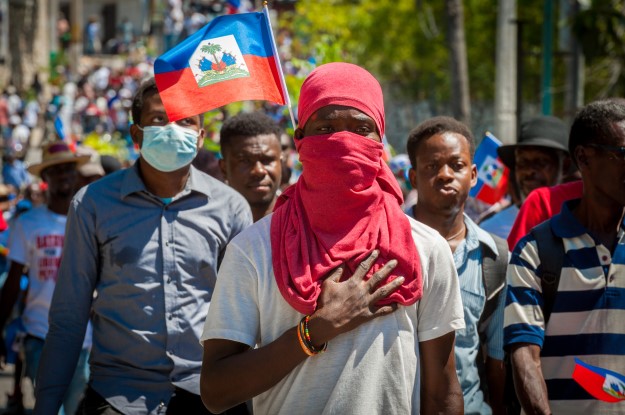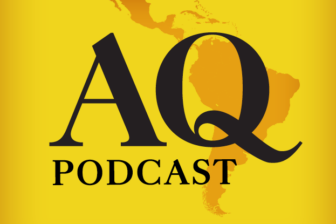PORT-AU-PRINCE – Haiti is at an existential moment. A perfect storm of corruption, hunger, the pandemic, and a terrifying rise of armed robberies and kidnappings has fueled a sense of desperation among Haitians as a political crisis escalates.
“We Haitians are living as if we’re already dead,” 32-year-old activist Domini Resain said at an assembly in Port-au-Prince in early May. Resain is part of a three-year protest movement led by young people that has its roots in 2018 riots over high fuel prices and a lack of jobs and health care. They have made state corruption and President Jovenel Moïse the target of escalating protests.
The latest concern is Moïse’s call for a controversial constitutional referendum, scheduled for June 27. Haitian legal experts and critics call it illegal and few have confidence the vote can be pulled off democratically.
Haitians are being asked to vote for a new constitution drafted by a five-person commission named by Moïse. The 1987 constitution prohibits amendments to the constitution via referendums. Opposition parties and civil society say the process lacks credibility. Some have called Moïse a dictator and accused him of curbing freedoms with autocratic decrees while looting and destabilizing state institutions. Moïse’s own party and cohorts, meanwhile, have denounced technical flaws in Haiti’s electoral system and the illegitimacy of the electoral council.
Rather than backing off, however, Moïse is determined to go through with the vote, claiming the constitution is not being amended, but is a new one altogether. He says the current constitution gives too much power to the legislative branch, and his proposal would eliminate the Senate and create a unicameral legislature, allow for immediate presidential reelection, and prevent a former president from being judged for corruption and other crimes after leaving office, among other changes.
The result is a constitutional crisis compounding the existing ones.
International pressure for a peaceful solution to the crisis is growing. The United States and the European Union, Moïse’s traditional allies, have decried the referendum process as non-participatory and non-inclusive. On May 18, Haiti’s Flag Day, the State Department’s Julie Chung questioned the referendum and called for an end to Moïse’s “one-man rule by decree” and for parliamentary and presidential elections to be held this year.
Moïse’s opposition and the Judiciary’s Superior Council says his mandate ended in Feb. 2021, but he says it ends in Feb. 2022, five years after he took office a year late due to a political stalemate after elections in 2015 were shelved due to fraud allegations. While he failed to organize parliamentary and local elections when they were due in 2018 and 2019, Moïse is now eager to do so, along with the constitutional referendum and presidential elections.
However, it’s obvious to all except him and the Biden administration that Haiti can’t hold two elections in 2021. There is no credible voter registration process, there is no security from violence, there is no independent electoral machine to guarantee fair and honest results. Most of Moïse’s opposition has called for a non-political independent prime minister to lead an interim period to restore security and prepare elections.
Many Haitians are weary of the international community’s response. Some have accused Washington of dictating the country’s agenda and derailing local efforts to reclaim Haiti’s sovereignty. This month, over 300 civil society organizations and individuals formed a 12-person “Commission to Search for a Haitian Solution to the Crisis in Haiti.”
Some foreign observers are listening. On May 18, four Democratic U.S. Representatives announced the formation of a House Haiti caucus, underscoring their support for a “Haitian-led democratic transition.” This follows a letter 68 members of Congress sent to Secretary of State Antony Blinken asking him to “listen to the voices from Haiti,” rather than impose an American solution to the country’s crisis.
The stakes are incredibly high. Haiti’s economy is in shambles with double-digit inflation, a massive budget deficit, and two straight years of negative growth. Over half of the country is under 24 years old, and hunger was spiking even before the pandemic. The UN considered over 40% of the country – 4.6 million people – to be food insecure in Feb. 2020, an 80% rise over 2019.
There is thus a high mistrust of politicians and of a state that is unwilling and unable to provide basic services to its population. The rejection of this system is, in fact, a reckoning – and one that is a long time coming.
“How can I live without food to eat? How can I live when I don’t have access to health care?” asked Resain. “There are many of us living like that. We are clearly in a collective battle against social injustice.”
It would be simplistic to see today’s crises as the latest chapter in the first Black republic’s descent into a chaotic “Somalization,” the dominant narrative of Haiti as a fragile or even a failed state. But Resain’s haunting portrait of injustice and lack of human dignity of the dispossessed, living as if already dead, is not some natural degression. It is the result of a violent economy of drug, arms and human trafficking facilitated by decades of corruption and abject neglect by past governments. This has made Haiti a country where the richest 20 percent of the population holds more than 64% of the country’s total income, compared to less than 2 percent held by the poorest 20 percent, according to the World Bank.
Seeds of hope
Still, while today’s rebellion – against entrenched inequality and the apartheid-like exclusion of the majority of Haitians – is a long time coming, this moment is also unique. So many sectors of society have in some way supported or joined the protests against injustice and Moïse.
The last three years have been a journey of contrasts. There has been police brutality, assassinations, human rights violations, massacres in impoverished neighborhoods, and a climate of terror orchestrated by gangs who control parts of the country. But there has also been sustained pro-democracy, social justice, anti-corruption and anti-impunity movements; a new crop of socially-conscious activists; the influx of educated, media-savvy millennial leaders, including numerous women, into the political spotlight; the emergence of several unlikely political coalitions; and a rising civil society that is staking its claim as a major player in the resolution of the crisis.
Most importantly, there is an overwhelming demand for rupture: a major, irrevocable break from the existing unresponsive and corrupt system, and hopes for a new governance model that can guarantee social services and a new more equal Haiti.
Indeed, while Haiti is in a terrible state, she carries something profound in her belly: the seeds of transformation, which are the voices, convictions, commitment and actions of its citizens. Over the last three years of mobilization efforts, in which many activists have died, they have shown that they cherish the ideal of a democratic and free society. Their demands for equality, access to healthcare, the end of hunger, quality education, decent jobs are real ideals. Many are ferociously working to achieve them, and, as Nelson Mandela said, if need be, they are prepared to die for them.
Many truly believe now is their last chance to make a transformative change.
—
Clesca is a Haitian journalist, member of civil society organizations, international development consultant and a retired United Nations official.





